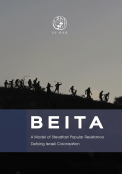On Land Day 2024, in honour of Palestinian resilience and struggle against Zionist settler-colonialism, Al-Haq launches its report titled: ‘Beita: A Model of Steadfast Popular Resistance Defying Israeli Colonisation’. While Israel unrelentingly conducts its ongoing genocide against the Palestinian people in Gaza, it simultaneously continues to entrench its Zionist settler-colonial project elsewhere in historic Palestine. This report showcases the Palestinian peoples’ resilience and endurance in their struggle for freedom through the unique model of popular resistance in Beita village against Israel’s settlement enterprise, and despite Israel’s violent suppression of resistance to its settler-colonial and annexationist acts.
Relying on Al-Haq’s historical field documentation since the 1980s and extensive field research carried out between May 2021 and May 2022, the report traces the historical and ongoing defiance and struggle of Palestinian residents of Beita, located southeast of Nablus in the occupied West Bank, against Israel’s settler-colonisation. It outlines two milestones of the village’s struggle. First, the defiance of Beita residents in the 1980s during the first Intifada following the killing of two residents by armed Israeli settlers, and the ensuing Israeli collective punishment campaign against the entire village. Second, Beita’s ongoing popular resistance against the establishment of the ‘Evyatar’ colonial outpost on their lands in Mount Sbeih (Jabal Sbeih) in May 2021, amidst the Unity Uprising.
The report analyses the unique model of popular resistance and steadfastness in Beita led by the ‘Guards of the Mountain’ since May 2021. This model, which is characterised as being people-organised and led, intergenerational, and inclusive of all members of the society, reflects a unified community and a firm belief that resistance is an ongoing endeavour.
Beita represents the experience of many Palestinian villages and towns persecuted by decades of settler-colonisation, carried out through violence, land appropriation, collective punishment, closures, economic subjugation, and the creation of coercive environments, to ultimately forcibly transfer Palestinians from their lands and replace them with Israeli colonial settlers. The report examines Israel’s policies and practices in supporting the settlement in Beita, especially in light of the ongoing attempts to ‘legalise’ the Evyatar colonial outpost.
The report further highlights Israel’s systematic suppression of any form of Palestinian resistance. In attempting to crush the spirit of popular resistance in Beita, the Israeli Occupying Forces (IOF) have used unnecessary and disproportionate force against protesters, killing ten Palestinians and injuring 6,454 others, including paramedics and journalists, and arbitrarily detaining 150 Beita residents in the reporting period, between May 2021 and May 2022. Israel has also imposed collective punishment measures, carried out raids, closed off the village’s entrances, revoked work permits, and levelled roads and infrastructure to impede protests, and the movement of ambulances. These are the names of the ten Palestinians killed: Issa Suliman Barham (40), Tariq Omar Snobar (27), Zakaria Maher Hamayel (25), Mohammad Saed Hamayel (16), Ahmad Zahi Bani Shamsa (15), Shadi Omar Salim (41), Imad Ali Dweikat (38), Mohammad Ali Khabisa (28), Jamil Jamal Abu Ayash (32), Fawaz Ahmad Hamayel (47).
By interviewing the survivors of the 1988 collective punishment campaign, and those enduring suppression since May 2021, the report underscores the profound and continuous impact of Israeli violence on the health, socio-economic status, and psychological well-being of the Beita community. Those particularly affected include members of the community who have lost their loved ones and/or their homes, those who have developed disabilities from their injuries, as well as those exiled from the village and denied their basic human rights in exile.
Israeli settler violence against Beita residents has continued beyond the reporting period. Throughout 2023, Beita residents were subjected to unnecessary and disproportionate force. Since 7 October 2023, the IOF have killed five Beita residents with live ammunition, four of whom were children, Imad Jareh Majed E’daily (16), Karam Ayman Mohammad Dweikat (17), Mohammad Ibrahim Fahed Bahloul (10), Mu’ath Ashraf Faleh Bani Shamsa (16), and Ameed Saed Ghaleb Bani Shamsa (34). Other IOF acts against the community include, settler attacks, road closures and movement restrictions, raids and arrest campaigns, attacks on medical personnel and paramedics, and obstruction of their work and ability to access those injured, hospitals and healthcare facilities. Israel also continues to target Palestinian immovable property in Beita, including bulldozing and levelling the road leading to the village landfill, and demolishing privately-owned structures in the village, for the purpose of settlement expansion.
The Beita report stands as a testament to the ongoing Nakba, the continued struggle of the Palestinian people against Israel’s settler-colonial apartheid regime, which engenders systematic violence against the Palestinian people, denying them their right to self-determination. The report places Beita’s experience in defying Israel’s settler-colonial apartheid regime in the framework of the Palestinian people’s inalienable right to self-determination, and their right to resist colonisation in the pursuit of freedom, justice and dignity. The resilience and resistance exhibited by the residents of Beita not only reflect their profound sacrifice, but also the Palestinian people’s relentless pursuit of liberation and justice.
As we commemorate the 48th anniversary of Land Day, the day the Israeli police killed six Palestinians with Israeli citizenship as they were protesting Israel’s expropriation of thousands of dunums of their land in the Galilee, we mark the continued struggle of the Palestinian people in defending their lands from the Zionist settler-colonial project, including the ever-growing expansion of Israel’s colonial settlement enterprise, annexation, and violent suppression of their right exist as a people in their land.
For Beita’s story, please see the full report in English here.
Additional sources:


